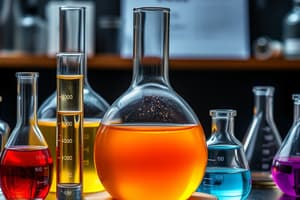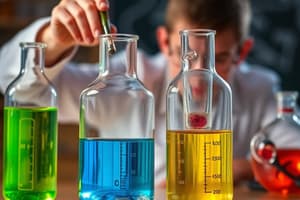Podcast
Questions and Answers
Which of the following is NOT a characteristic of scientific knowledge?
Which of the following is NOT a characteristic of scientific knowledge?
- It relies on sophisticated tools and technologies.
- It is absolute and unchanging. (correct)
- It is constantly evolving and refined.
- It is based on evidence-based reasoning.
What is the primary function of microscopes in science?
What is the primary function of microscopes in science?
- To analyze data and create models of complex systems.
- To study the behavior of large animals in their natural habitats.
- To measure the mass of substances in a controlled laboratory environment.
- To view objects that are too small to be seen with the naked eye. (correct)
What is the significance of scientific laws in the field of science?
What is the significance of scientific laws in the field of science?
- They are purely theoretical concepts that have no practical application in the real world.
- They are simply suggestions or guesses about how the natural world works.
- They are descriptive statements or equations that summarize a large body of experimental data. (correct)
- They provide definitive and absolute explanations for all natural phenomena.
Which of the following is NOT considered a key aspect of the scientific process?
Which of the following is NOT considered a key aspect of the scientific process?
What is the role of ethical considerations in scientific research?
What is the role of ethical considerations in scientific research?
What is the primary purpose of a hypothesis in the scientific method?
What is the primary purpose of a hypothesis in the scientific method?
What is the main difference between a controlled experiment and an uncontrolled experiment?
What is the main difference between a controlled experiment and an uncontrolled experiment?
What does the principle of falsifiability suggest about scientific hypotheses?
What does the principle of falsifiability suggest about scientific hypotheses?
Which of the following best exemplifies the principle of parsimony (Occam's Razor) in scientific thinking?
Which of the following best exemplifies the principle of parsimony (Occam's Razor) in scientific thinking?
Which of the following is NOT a characteristic of the scientific method?
Which of the following is NOT a characteristic of the scientific method?
Which branch of science focuses on the study of living organisms and their interactions?
Which branch of science focuses on the study of living organisms and their interactions?
What is the significance of objectivity in scientific investigations?
What is the significance of objectivity in scientific investigations?
Which of the following is an example of a branch of Earth science?
Which of the following is an example of a branch of Earth science?
Flashcards
Scientific Knowledge
Scientific Knowledge
Evolving understanding of the natural world based on new evidence.
Microscopes
Microscopes
Tools that allow scientists to view tiny objects, like cells.
Nature of Science
Nature of Science
A process of inquiry that uses evidence and reasoning to explore the natural world.
Scientific Theories
Scientific Theories
Signup and view all the flashcards
Scientific Laws
Scientific Laws
Signup and view all the flashcards
Scientific Method
Scientific Method
Signup and view all the flashcards
Observation
Observation
Signup and view all the flashcards
Hypothesis
Hypothesis
Signup and view all the flashcards
Controlled Experiment
Controlled Experiment
Signup and view all the flashcards
Data Collection
Data Collection
Signup and view all the flashcards
Data Analysis
Data Analysis
Signup and view all the flashcards
Reproducibility
Reproducibility
Signup and view all the flashcards
Parsimony (Occam's Razor)
Parsimony (Occam's Razor)
Signup and view all the flashcards
Study Notes
Scientific Method
- Science is a systematic way of acquiring knowledge about the natural world.
- The scientific method is a framework for conducting scientific inquiry.
- It includes observation, forming a hypothesis, designing experiments, collecting data, analyzing data, drawing conclusions, and communicating results.
- The scientific method is iterative and flexible. Scientists often revisit steps and refine their approaches as new information emerges.
- Observations begin the scientific process. They are careful and detailed records of natural phenomena.
- A hypothesis is a testable explanation for an observation. It must be specific and falsifiable.
- Experiments are designed to test hypotheses. They involve manipulating variables to observe their effects on other variables.
- Controlled experiments compare an experimental group with a control group. Only the independent variable is changed between them.
- Collecting data involves measuring and recording variables.
- Data may be qualitative (descriptive) or quantitative (numerical). Both have value to scientists.
- Data analysis involves organizing and interpreting data. Statistical methods are often employed.
- Conclusions are drawn from the analyzed data. They support or refute the hypothesis.
- Sharing scientific findings allows for scrutiny and replication by other scientists. Peer review is crucial.
Branches of Science
- Sciences are often categorized into various branches.
- Biological sciences study living organisms and their interactions.
- Examples include botany, zoology, ecology, microbiology.
- Physical sciences study non-living systems.
- Examples include physics, chemistry, astronomy, geology.
- Earth science studies the Earth and its processes.
Scientific Principles
- Science operates under certain fundamental principles.
- Objectivity means that scientific investigations are based on empirical evidence rather than personal biases.
- Reproducibility implies that experiments can be repeated by others to verify results.
- Falsifiability means that hypotheses can be disproven. Unsupporting data mean the hypotheses should be revised or replaced.
- Parsimony, or Occam's Razor, states that the simplest explanation is preferred when multiple explanations are possible.
- Uncertainty is often present in scientific knowledge because of limitations in observation and measurement. Scientists often use probabilistic language & statistical analysis to account for limitations.
- Scientific knowledge is constantly evolving and refined. New observations and technologies lead to revisions and advancements in our understanding.
Scientific Tools and Technologies
- Science relies on sophisticated tools and technologies for observation, measurement, and experimentation.
- Microscopes allow scientists to view minute objects, like cells.
- Telescopes allow to observe distant objects.
- Computers and software aid in data analysis and modeling complex systems.
- Laboratory equipment (e.g., beakers, pipettes, centrifuges) provides controlled environments.
- Specialized instruments allow researchers to focus on precise measurements and conditions (e.g., mass spectrometers, chromatography systems).
- Instruments often help quantify, document, and reveal insights that may not be evident otherwise. Precise measurements are vital for conclusions.
The Nature of Science
- It is a process of inquiry that investigates the natural world.
- It is a way of thinking and approaching problems.
- Science is provisional, meaning it is subject to change and refinement.
- It relies on evidence-based reasoning.
- Science is cumulative; new knowledge builds upon existing knowledge and builds consensus.
- Scientific theories are well-substantiated explanations of some aspect of the natural world.
- Scientific laws are descriptive statements or equations that summarize large amounts of experimental data. Often used in mathematics to represent a naturally occurring phenomena or function.
- The process respects ethical considerations. Scientists adhere to guidelines for data integrity, minimizing damage to the environment, and respecting the well-being of participants.
- It addresses fundamental questions and expands understanding of the world around us.
Studying That Suits You
Use AI to generate personalized quizzes and flashcards to suit your learning preferences.




